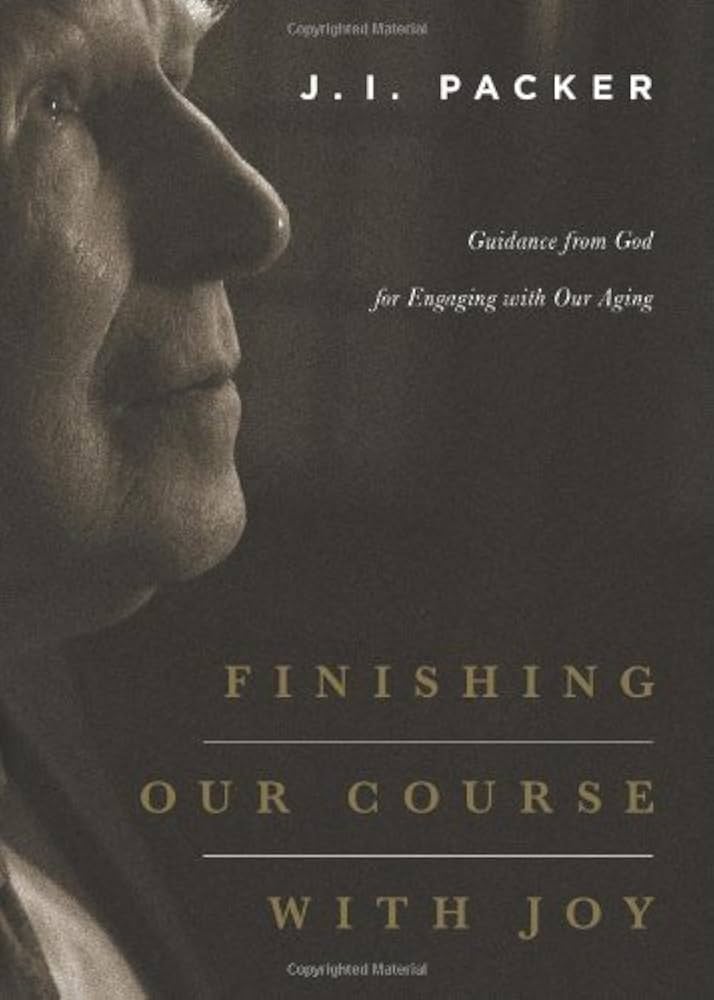 This biblical
expectation and, indeed, promise of ripeness growing and service of others continuing as we age with God is the substance of the last-lap image of our closing years, in which we finish our course. Runners in a distance race, like jockeys in a horse race, always try to keep something in reserve for a final sprint. And my contention is going to be that, so far as our bodily health allows, we should aim to be found running the last lap of the race of our Christian life, as we would say, flat out.
The final sprint, so I urge, should be a sprint indeed.
This biblical
expectation and, indeed, promise of ripeness growing and service of others continuing as we age with God is the substance of the last-lap image of our closing years, in which we finish our course. Runners in a distance race, like jockeys in a horse race, always try to keep something in reserve for a final sprint. And my contention is going to be that, so far as our bodily health allows, we should aim to be found running the last lap of the race of our Christian life, as we would say, flat out.
The final sprint, so I urge, should be a sprint indeed.
“Live each day as if thy last” is a wise word from a hymn written in 1674 by Thomas Ken. The older we get, the more needful its wisdom becomes, and if we have not already taken it to heart, we should do so now. When we unpack Ken’s admonition, three thoughts emerge.
First, live for God one day at a time. Whatever long-term plans we may have, we need to get into the habit of planning each day’s business in advance,
either first thing each morning or (better, I think) the day before. Glorifying God should be our constant goal, and to that end we need to acquire the further habit of reviewing before God as each day closes how far we have done as we planned, or whether and why and how far we changed the plan to fit new circumstances and fresh insights, and in any case how far we did the best we could for our God, and how far we fell short of doing that. Surely it is increasingly important that we be doing
this as we approach the end of life and the prospect of giving an account of ourselves to God.
Second, live in the present moment. Get into the way of practicing God’s presence—more specifically, Christ’s presence, according to his promise to be with us always (Matt. 28:20)—and cultivate the divine companionship. This, too, is an important and, I suspect, widely neglected spiritual discipline nowadays, and its importance also would seem to grow as we near life’s
end.
Daydreaming and indulgence of nostalgia are unhappy habits, making for unrealism and dis-content. Like all bad habits, they tighten their grip on us until we set ourselves against them and, with God’s help, break them. Elderly retirees are prone to find that a disciplined breaking of them is an increasingly necessary task in life’s last lap, in which steady looking ahead in each present moment becomes a bigger and bigger factor in inner spiritual health.
Third, live
ready to go when Christ comes for you. Jesus’s words to the faithful eleven are in fact a promise to all his faithful disciples in every age:
In my Father’s house are many rooms. If it were not so, would I have told you that I go to prepare a place for you? And if I go and prepare a place for you, I will come again and will take you to myself, that where I am you may be also. (John 14:2–3)
The experience of dying varies from one to another. Some of us
will be conscious and relatively alert right up to the moment of our going; some will sink into unconsciousness as our bodies progressively close down; some will die in a coma, or while asleep, or in a sudden accident or attack on our person, or from heart stoppage; and we cannot foresee how it will be for us. So the way of wisdom is to be ready for whatever comes, whenever it comes.
What does this involve? More than merely making a will, giving directions for one’s funeral, and arranging for
the disposal of one’s property. First and foremost, it involves direct, sober dealing with the Lord Jesus Christ himself, who is not only the one who will come as our courier to take us through our transition from this world to the next, but also the one who at some point in that world will be our Judge. “For we must all appear before the judgment seat of Christ, so that each one may receive what is due for what he has done in the body, whether good or evil” (2 Cor. 5:10). More about that later;
here, I would only stress the urgency of entering, here and now, by faith, into a personal relation of discipleship to Christ, the invisibly present Savior and Lord, as in and through the gospel he himself invites everyone to do. This will banish all fears about our future.
A British professor of theology once described to me the world to which believers will go as “an unknown country with a well-known inhabitant.” When Jesus Christ the courier has already become well known to us through the
Gospels and Pastoral Letters of the New Testament, the prospect of transitioning with him into a world in which we shall see him as he is and be constantly in his company will be something we find alluring rather than alarming.
J. I. Packer, Finishing Our Course with Joy: Guidance from God for Engaging with Our Aging (Wheaton, IL: Crossway, 2014), 21–26.